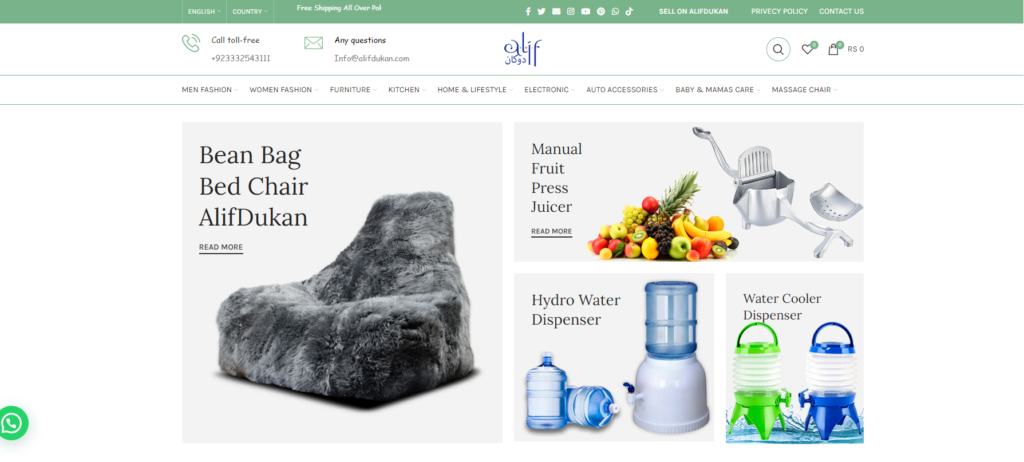What is an e-commerce business?
HOME » WHAT IS AN E-COMMERCE BUSINESS?
What is an e-commerce business?
An e-commerce business is a type of business that operates and sells products or services over the internet.
This can be through a standalone website or through a platform such as Amazon, eBay, or Etsy.
E-commerce businesses often offer a wider range of products or services than traditional brick-and-mortar
businesses and can reach a larger customer base as they are not limited by geographical location.
ALIFDUKAN
Alifdukan is An online shopping store that allows customers to purchase products directly from the website.
WIDE RANGE
Alifdukan offers a wide range of products such as clothing, electronics, home goods, or health and beauty products.
MOTIVE
Our motive is to Provide high-quality products and services. Customers will be more likely to shop at our online store.
SHIPPING
Customers can easy to use it, with clear navigation and a checkout process .”No shipping fees! All orders come with free shipping.”
Examples of e-commerce businesses include online retailers selling physical products, digital product merchants selling items like software, music, and e-books, and service providers offering services like web design and consulting.
An e-commerce business is a type of business that operates and sells products or services over the internet. This can be through a standalone website or through a platform such as Amazon, eBay, or Etsy.
E-commerce businesses often offer a wider range of products or services than traditional brick-and-mortar businesses and can reach a larger customer base as they are not limited by geographical location.
Examples of e-commerce businesses include online retailers selling physical products, digital product merchants selling items like software, music, and e-books, and service providers offering services like web design and consulting.
What are the 3 types of e-commerce?
There are three main types of e-commerce:
- B2C (Business-to-Consumer): This type of e-commerce involves businesses selling products or services directly to consumers. Examples include Amazon, eBay, and other online retailers.
- B2B (Business-to-Business): This type of e-commerce involves businesses selling products or services to other businesses. Examples include wholesalers selling products to retailers, and manufacturers selling products to distributors.
- C2C (Consumer-to-Consumer): This type of e-commerce involves individuals selling products or services directly to other consumers. Examples include eBay and Craigslist.
There are also other types of e-commerce, such as B2G (Business-to-Government) and C2B (Consumer-to-Business), but B2C, B2B, and C2C are the most common.
What are e-commerce business examples?
Here are some examples of e-commerce businesses:
- Online retailers: Amazon, eBay, and Walmart are some of the largest online retailers that offer a wide range of products for consumers to purchase.
- Digital product merchants: Apple’s iTunes Store and Google Play Store are examples of digital product merchants that sell music, movies, books, and other digital content.
- Service providers: Freelancer and Upwork are examples of e-commerce businesses that offer services like web design, writing, and programming.
- Subscription-based businesses: Netflix and Spotify are examples of e-commerce businesses that offer monthly or yearly subscriptions for access to their content.
- Social commerce: Instagram and Facebook allow businesses to sell products directly to consumers through their platforms.
- B2B e-commerce: Alibaba is a well-known B2B e-commerce platform that connects businesses with suppliers and manufacturers.
These are just a few examples of the many types of e-commerce businesses that exist. The specific type of e-commerce business depends on the products or services being sold and the target customer.
How to start an e-commerce business?
Starting an e-commerce business can be a challenging but rewarding experience. Here are the steps you can follow to start your own e-commerce business:
- Conduct market research: Research your target market and competition to determine if there is a demand for your products or services.
- Choose a niche: Select a specific product or service that you want to sell and focus on building your brand around it.
- Create a business plan: Develop a plan that outlines your goals, strategies, and budget.
- Choose your business structure: Decide on the legal structure of your business, such as a sole proprietorship, partnership, limited liability company (LLC), or corporation.
- Register your business: Obtain any necessary licenses and permits, and register your business with the government.
- Set up your e-commerce platform: Choose a platform to host your websites, such as Shopify, WooCommerce, or Magento.
- Establish payment and shipping methods: Set up payment options, such as credit cards, PayPal, or bank transfers, and determine your shipping methods.
- Launch your e-commerce site: Develop and launch your website, and start promoting it through social media, search engine optimization (SEO), and other marketing methods.
- Continuously improve: Monitor your results, gather customer feedback, and make necessary changes to improve your business.

